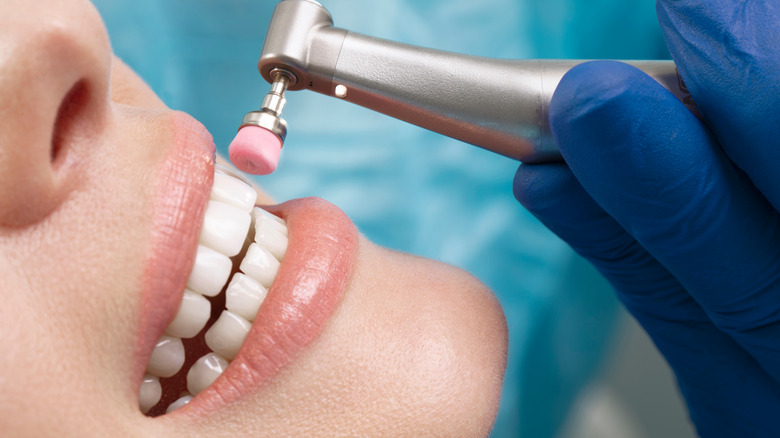How Much Money Do Dental Hygienists Make?
A dental hygienist is in charge of ensuring each dental patient has a clean, healthy mouth, per The Balance Careers. In fact, if you are going to the dentist for a routine cleaning, you are likely spending the majority of your appointment with a dental hygienist, only seeing a dentist to ensure everything is okay. Each state is different in regards to the role of a hygienist, but overall, they are tasked with providing a thorough cleaning of the mouth, removing stains and buildup on the teeth, taking x-rays when needed, providing fluoride or adding sealants, and may even deliver local anesthesia for patients undergoing a dental procedure.
One of the most important roles of a dental hygienist, though, is educating patients on proper oral health so they can avoid having to see their dentist, per Regis College. Hygienists and dentists work as a team, where the hygienist is tasked with communicating directly with the patient and passing on important information to the dentist. And while a dental hygienist may not make as much money as a dentist, they can still expect to be paid fairly well.
Dental hygienists make a good yearly salary
According to the U.S. News & World Report, a dentist can expect to make around $158,000, while those in certain states can even see salaries in the $200,000 range. But becoming a dentist requires a lot of time — also according to the U.S. News & World Report, dental school takes about four years to complete. So if you are interested in dentistry, but don't want to spend the next few years in school, becoming a dental hygienist is a great option.
According to The Balance Careers, the median salary for a dental hygienist is about $74,070, but depending on where you live and your skill level, you can make a lot more than the average. Dental hygienists who live in Alaska make six figures, with the mean salary coming in at $107,190, per Forbes. Other high-paying states include California, Washington, Maryland, and New Mexico. And a good salary isn't the only perk of this career. The U.S. News & World Report noted that the job outlook for dental hygienists is also great. Between 2020 and 2030, there should be an 11% increase in dental hygiene positions, which accounts for over 23,000 additional jobs.
How to become a dental hygienist
While you won't need to attend dental school for four years, you still need proper education and training to successfully become a dental hygienist. According to Regis College, you need, at minimum, an associate's degree to become a dental hygienist, but those who earn a bachelor's degree or higher may have more opportunities for higher-paying jobs. Once your degree is secured, you will need to get licensed in your state, per The Balance Careers. This license requires a written and clinical exam, both of which you will need to pass in order to get hired as a hygienist.
In addition to education, a dental hygienist also needs to possess certain personal skills. It's not uncommon for people to be scared of dental procedures, so having compassion is extremely important in this career. You will be working with people all day long, so having the ability to calm and reassure others is also vital. Since you will likely be working long hours, stamina is a bonus, and attention to detail is necessary as well.


